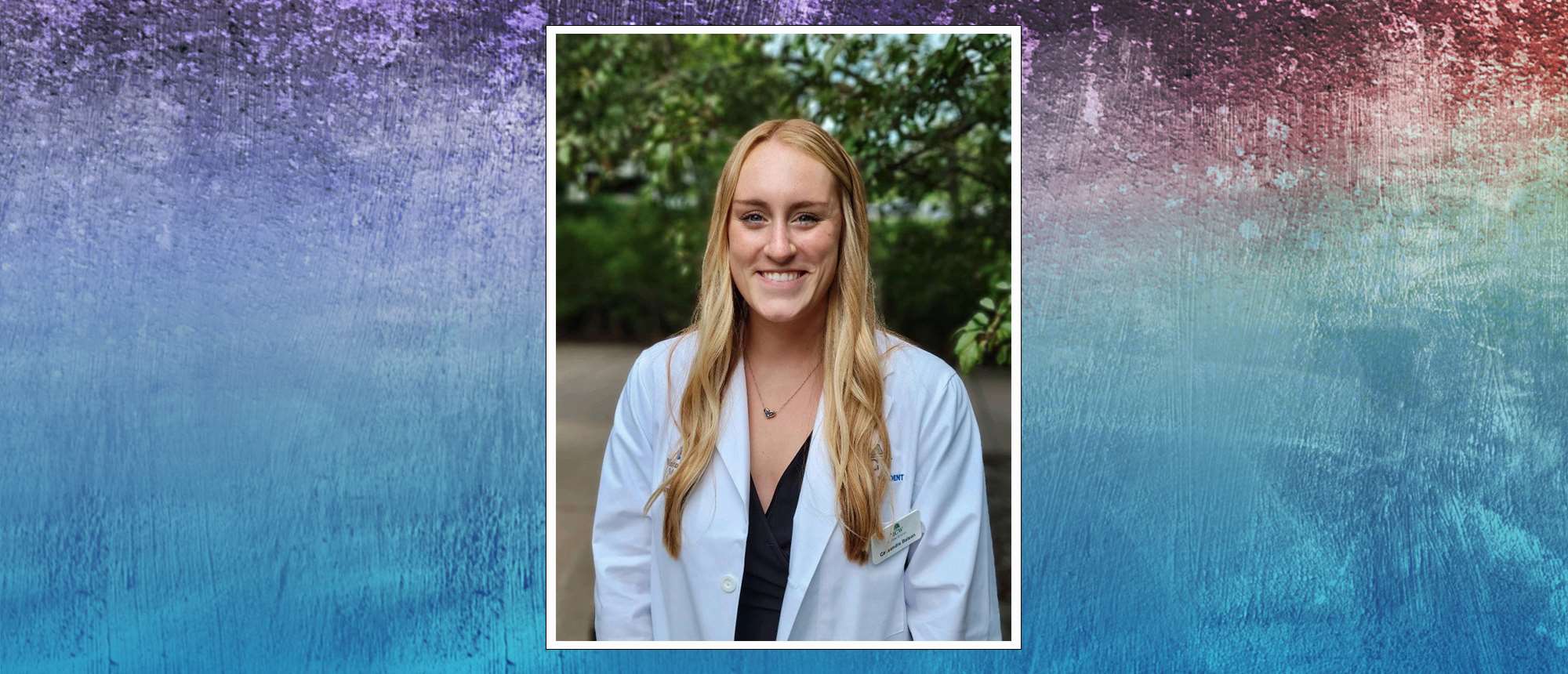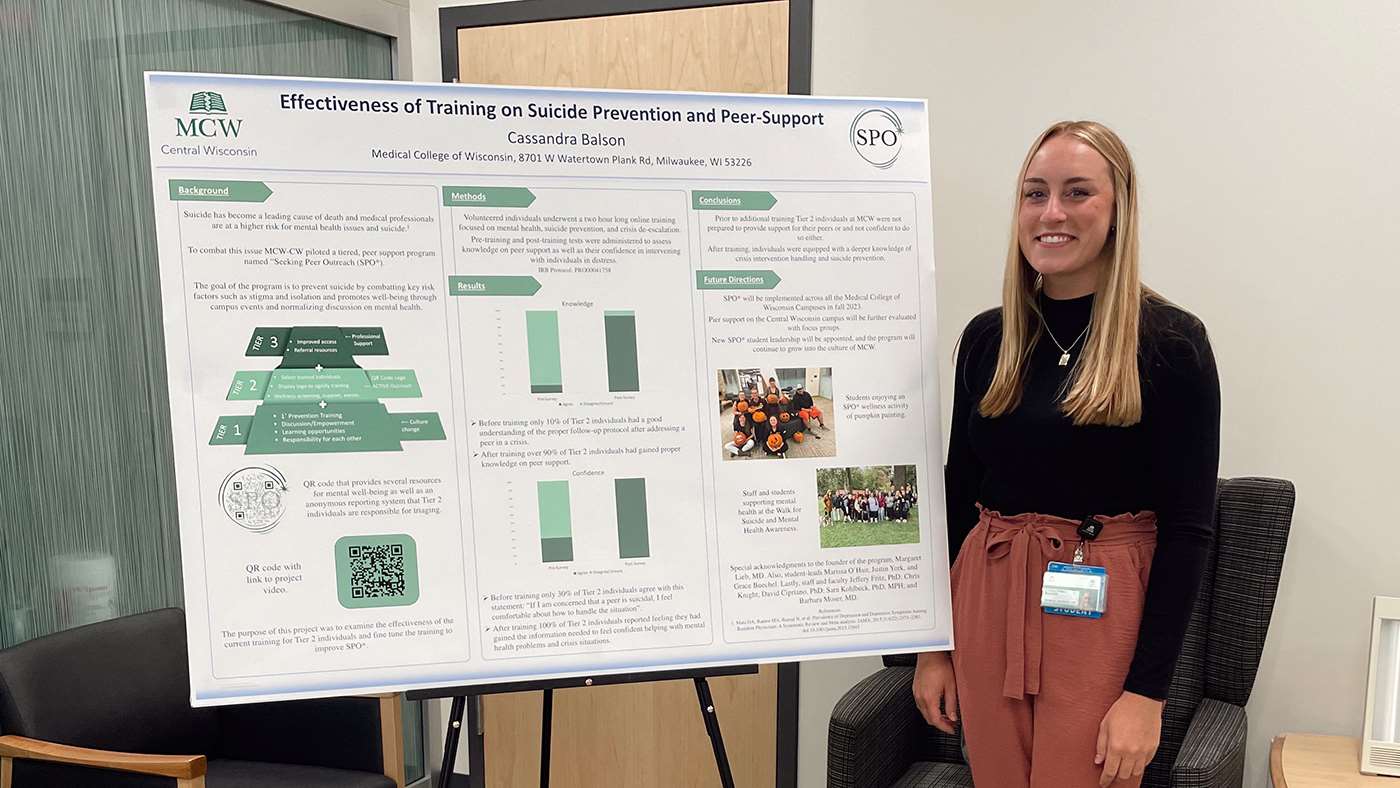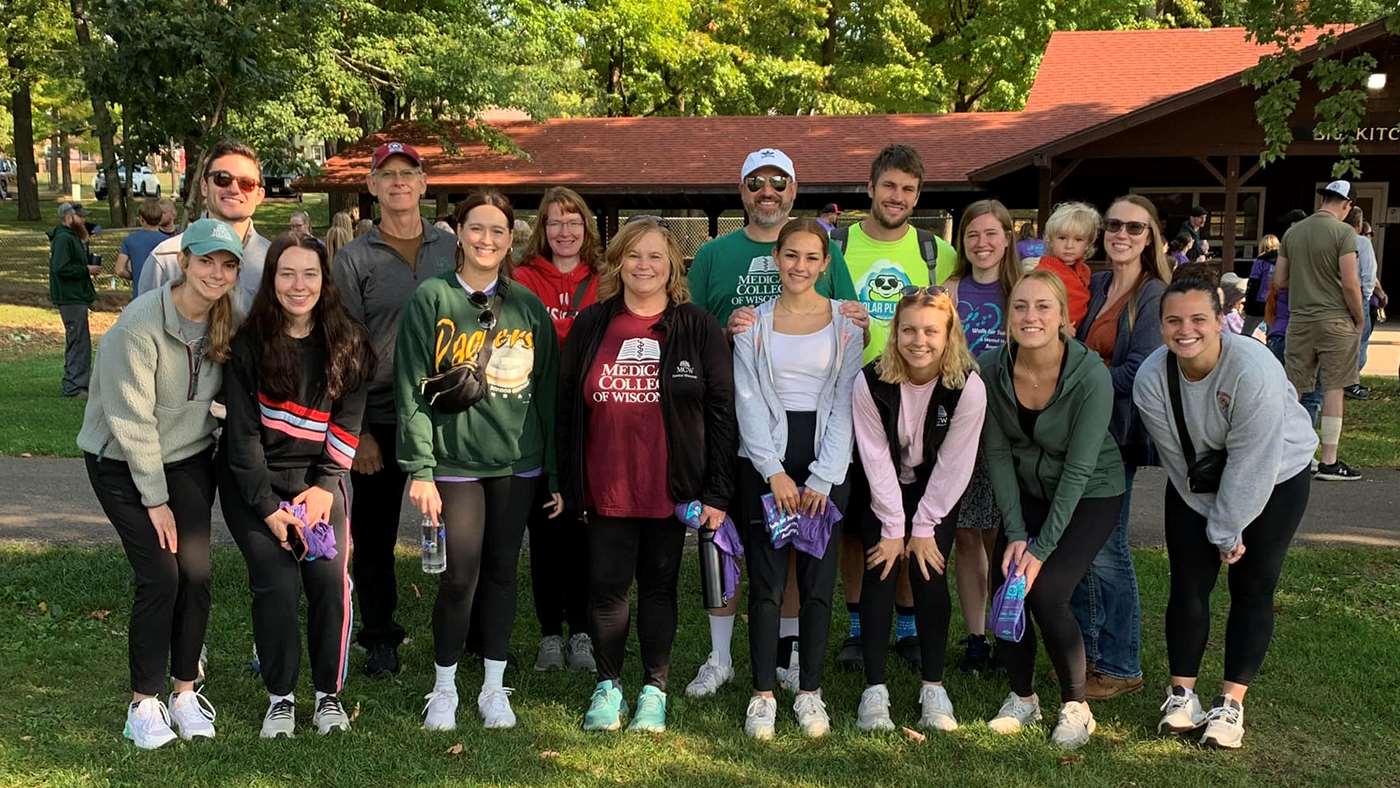‘Medicine Chose Me': MCW Student Ready for Next Step in Journey

With Match Day around the corner on March 15, the time when graduating medical students around the country find out where they’ll go for their residency, Casey Balson will leave the Medical College of Wisconsin-Central Wisconsin knowing she left her mark at the school and beyond. Balson, who graduates in May, helped create a peer support program for fellow medical students at MCW.
The program, Seeking Peer Outreach, is a student-led approach to addressing mental health among medical students, including issues such as stigma, isolation, depression and suicide risk.
“We worked super hard to create an open, welcoming environment on campus where people felt like they could share their mental health struggles,” Balson says.
Research has found that healthcare providers have a higher rate of suicide than the general population and face additional stigmas that may decrease their willingness to seek support for well-being.
Balson and fellow MCW student Justin York began working as first-year medical students with Margaret Lieb, who started the program on the MCW-Central Wisconsin campus in Wausau and has since moved on to pursue her plastic surgery residency training at Southern Illinois University. In York and Balson’s second year at MCW, they became student leads, overseeing the program as the pilot was completed and implementation began.

Providing Mental Health Support to Medical Students
Seeking Peer Outreach features three tiers of support, similar to the Supporting our Staff program implemented within the Froedtert & MCW health network. The first tier includes all current students, staff and faculty. Tier 1 focuses on culture change by promoting discussion and mental well-being activities that help normalize an environment where students can share their mental health struggles.
Tier 2, which Balson focused on, consists of individuals who completed additional training on suicide prevention and crisis intervention. The training prepares them to recognize warning signs of declining mental health and be able to intervene in different mental health crisis situations. The final tier is composed of licensed mental health professionals who are utilized in situations that exceed the expertise of a trained Tier 2 individual.
“It’s been really cool to see how the program played out and changed the environment and morale on our campus,” Balson says.
Balson says she is thankful to have worked with so many wonderful people to help create and launch Seeking Peer Outreach, including Barbara Moser, MD, mental health and suicide prevention educator and advocate, David Cipriano, MS, PhD, MCW associate professor of psychiatry and behavioral medicine and director of student and resident behavioral health, and Sara Kohlbeck, PhD, MPH, the Dr. and Mrs. Michael C. Kubly Community-Based Suicide Prevention Research Assistant Professor in the MCW Department of Psychiatry and Behavioral Medicine.
All in all, the experience taught her about leadership and having the confidence to voice her opinions, she says.
“It helped me build my voice in situations and build who I am as a leader and my passions in suicide prevention and mental health,” Balson says.
Becoming an Advocate for Mental Health
Balson’s work on the program and training at MCW to become a physician is the continuation of a long journey of supporting mental health that began when she was in eighth grade.
“I was exposed to a mental health crisis,” shares the Muskego, Wisconsin native.
A close friend called Balson during an active suicide attempt. Not knowing she could handle such an extreme situation, she did everything she could to make sure her friend was safe.
“I think then I began to realize I have all these intrinsic characteristics that would make me great in that field,” Balson says.
She had similar experiences in high school, with friends and others opening up to her about their mental health. That cemented her plan to study psychology at Illinois State University, where she had earned a swimming scholarship. As an undergrad, Balson also volunteered with the National Suicide Prevention Lifeline, a network of crisis centers that provide free and confidential support to people in emotional distress or who are struggling with suicidal ideation. Some people, she says, just wanted to talk, while other times she had to deescalate an acute crisis.

“A mentor at the time told me that I stay very calm in chaotic situations,” Balson says.
Believing she had found her calling, Balson applied to medical school. Although she wasn’t accepted the first time she applied, she didn’t give up and was accepted in her second try to MCW-Central Wisconsin.
“Medicine chose me almost,” she says.
She credits her family with helping her overcome the challenges she faced before medical school and the additional stress she and other students experience as they complete their rigorous training.
“You really get caught up in this bubble of being in medical school where it feels like everything is the weight of the world,” she says.
When doubts crept in, Balson’s mother, father and sister were always there to reassure her.
Keep at it. You can’t get discouraged. Stay motivated. Chase after your dreams, they told her.
“I really don’t know what I would have done without their support,” Balson says.
Turning a Calling into a Career
As she prepares to embark on her next journey, Balson says she is thankful for her experience at MCW-Central Wisconsin.
“I talk to literally everybody on campus,” she says. “It’s made it such a good environment to go to med school.”
She also greatly appreciates the professional development training she received from MCW-Central Wisconsin Assistant Professors Kay Lockwood, MD, and Colette Solatka, MD.
“When I look at them, they’re everything I want to be one day as a physician, and how they interact with us as mentors is how I hope to be a mentor for students one day as well,” she says.
Balson hopes to stay in Wisconsin for residency or return to Wisconsin to practice one day should Match Day take her elsewhere. She also hopes that the program she helped create will expand beyond medical students into residency programs.
“I want to be able to use it to help my co-residents for their mental health as we transition into being physicians,” Balson says.
As far as her career, Balson says she can see herself working in emergency psychiatry but is open to other areas of the field.
“I’m really excited to get into psychiatry and explore all the different avenues and find my little niche and specialty,” she says. “One thing that makes me so excited about psychiatry is how many options there are in that field itself.”
Resources
To learn more about mental health services, programs, and resources for MCW students and residents, visit Student and Resident Behavioral Health.
To learn more about MCW’s efforts toward improving the lives of those affected by psychiatric diseases and behavioral disorders, visit The Department of Psychiatry and Behavioral Medicine, and to learn about the study and prevention of suicide in our community, visit The Division of Suicide Research and Healing.



